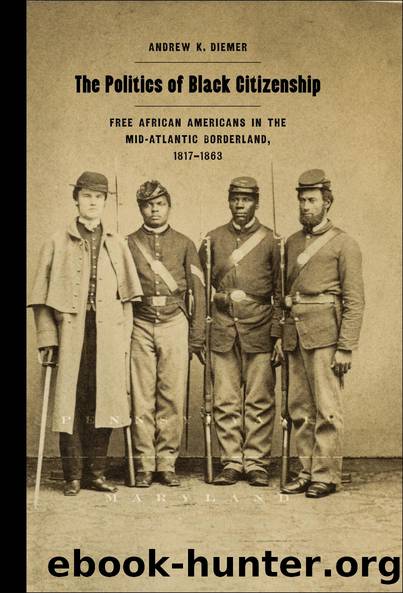The Politics of Black Citizenship by unknow

Author:unknow
Language: eng
Format: epub
Tags: Nonfiction, Social & Cultural Studies, Social Science, Cultural Studies, African-American Studies, History, Americas, United States, 19th Century
ISBN: 9780820349367
Publisher: University of Georgia Press
Published: 2016-07-15T04:00:00+00:00
PART IV
The Fugitive Slave Law and the Coming of the Civil War
CHAPTER 7
The Tumultuous Politics of the Early 1850s
On the evening of October 14, 1850, a group of black Philadelphians met in Brick Wesley Church, on Lombard Street below Sixth, to attack the recently adopted Fugitive Slave Law. A friendly account in the North Star described it as âthe recent large Meeting of the colored citizens of Philadelphiaâ; an openly hostile notice in the Baltimore Sun termed it âvery largely attended,â adding that âseveral of the colored orators have made flaming speeches againstâ the law.1 Organizers intended not merely to rally black opposition to the law but also to make a larger case to the white public.
The resolutions passed by the meeting attempted to place resistance to the Fugitive Slave Law squarely in the tradition of the American Revolution. The law violated both the Declarationâs guarantees of âinalienable rightsâ and the Constitutionâs provisions for protecting those rights. In particular, according to the resolution, the law conflicted with the Constitutionâs provision regarding habeas corpus and its provision that âno person shall be deprived of life, liberty, or property without due process of law.â Further stressing the analogy between their struggle and that of the Founders, the authors closed the preamble to the resolutions by declaring, âWe hereby pledge our lives, our fortunes, and our sacred honorâ to resisting the Fugitive Slave Law. The resolutions attacked the measure by appealing to law and morality as well as by painting opposition as defending the family against efforts to tear it apart. One resolution pointed to the hypocrisy of white northerners who applauded and welcomed the refugees from foreign tyranny but spurned people fleeing from domestic tyrants.2
The Fugitive Slave Law led some African Americans to despair. It offered evidence that whites would ultimately sacrifice the citizenship rights of free blacks to appease slaveholders, and it spurred many, especially fugitives, to leave the United States.3 Among those who remained, particularly along the mid-Atlantic border, the law provoked active resistance and an increasing willingness to resort to violence in defending themselves and the targets of slave catchers.4
At the same time, the broader response to the law illustrated the continuing importance of the struggle for black citizenship. The law demonstrated not only the Slave Powerâs political influence but also the limits of slaveholdersâ ability to control free blacks. Many whites who were willing to abandon some legal protections for free blacks in the interest of easing sectional tensions refused to deny blacks all citizenship rights or to abandon the free black residents of their state to the control of slaveholders.5 As tepid as this white support may have been, free blacks recognized that cultivating this support was critical. It was delicate work, and many free blacks, especially those in the borderland cities of Philadelphia and Baltimore, engaged in a cautious sort of activism that frustrated some of their allies. Cautious or not, the fight for black citizenship and the limited legal recognition won by that fight helped
Download
This site does not store any files on its server. We only index and link to content provided by other sites. Please contact the content providers to delete copyright contents if any and email us, we'll remove relevant links or contents immediately.
In Cold Blood by Truman Capote(3380)
The Innovators: How a Group of Hackers, Geniuses, and Geeks Created the Digital Revolution by Walter Isaacson(3178)
Steve Jobs by Walter Isaacson(2896)
All the President's Men by Carl Bernstein & Bob Woodward(2374)
Lonely Planet New York City by Lonely Planet(2223)
And the Band Played On by Randy Shilts(2202)
The Room Where It Happened by John Bolton;(2156)
The Poisoner's Handbook by Deborah Blum(2136)
The Innovators by Walter Isaacson(2102)
The Murder of Marilyn Monroe by Jay Margolis(2097)
Lincoln by David Herbert Donald(1987)
Being George Washington by Beck Glenn(1941)
A Colony in a Nation by Chris Hayes(1928)
Under the Banner of Heaven: A Story of Violent Faith by Jon Krakauer(1803)
Amelia Earhart by Doris L. Rich(1694)
The Unsettlers by Mark Sundeen(1687)
Dirt by Bill Buford(1672)
Birdmen by Lawrence Goldstone(1666)
Zeitoun by Dave Eggers(1648)
